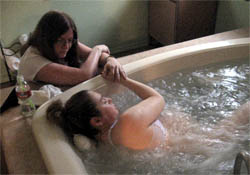Feb 22, 2026
Feb 22, 2026
by Ziana Qaiser
 For the birth of her second child, Martin hired a doula. Originating from an ancient Greek word meaning 'to serve women', a doula refers to someone trained to support a woman emotionally, and also educated in childbirth and related areas. "The doula's presence filled in that extra role that was missing," recalls Martin. "I came out of the birth feeling empowered and joyful instead of wounded and traumatized like I had the first time." Under the doula's guidance, her husband gave her the support and reassurance that she needed. In fact, so much did Martin, formerly a PhD student of literature, enjoy the whole experience that she decided to become a doula herself.
For the birth of her second child, Martin hired a doula. Originating from an ancient Greek word meaning 'to serve women', a doula refers to someone trained to support a woman emotionally, and also educated in childbirth and related areas. "The doula's presence filled in that extra role that was missing," recalls Martin. "I came out of the birth feeling empowered and joyful instead of wounded and traumatized like I had the first time." Under the doula's guidance, her husband gave her the support and reassurance that she needed. In fact, so much did Martin, formerly a PhD student of literature, enjoy the whole experience that she decided to become a doula herself.
14-Oct-2007
More by : Ziana Qaiser